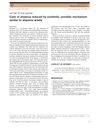 87 citations,
July 2018 in “Biochimica et Biophysica Acta (BBA) - Molecular Cell Research”
87 citations,
July 2018 in “Biochimica et Biophysica Acta (BBA) - Molecular Cell Research” Mice studies show that Protein Phosphatase 2A is crucial for cell growth, development, and disease prevention.
 79 citations,
March 2017 in “Dermatologic clinics”
79 citations,
March 2017 in “Dermatologic clinics” Vitiligo affects overall health and self-esteem, needing more research and awareness.
 8 citations,
February 2015 in “Cellular immunology”
8 citations,
February 2015 in “Cellular immunology” Deleting Snai2 and Snai3 causes fatal autoimmunity.
 1 citations,
June 2022 in “Photobiomodulation, photomedicine, and laser surgery” 1 citations,
May 2013 in “Hair transplant forum international”
1 citations,
June 2022 in “Photobiomodulation, photomedicine, and laser surgery” 1 citations,
May 2013 in “Hair transplant forum international” Non-classical 21 hydroxylase deficiency is an underdiagnosed cause of female hair loss and polycystic ovarian syndrome.
23 citations,
December 2013 in “Journal of Investigative Dermatology Symposium Proceedings” Genetic discoveries are leading to new treatments for alopecia areata.
 2 citations,
November 2015 in “Journal of Investigative Dermatology”
2 citations,
November 2015 in “Journal of Investigative Dermatology” RANKL improves the immune response against herpes simplex virus by enhancing T cell activation and could help develop better treatments or vaccines.
220 citations,
June 2013 in “The Journal of Pathology” Lichen planopilaris may be an autoimmune disease causing hair loss due to immune system issues in hair follicles.
47 citations,
December 2011 in “Experimental Dermatology” CGRP may help protect hair follicles from immune system attacks, potentially slowing hair loss.
 4 citations,
November 2017 in “The Journal of Dermatology”
4 citations,
November 2017 in “The Journal of Dermatology” Sorafenib may cause hair loss in a way similar to alopecia areata.
 3 citations,
April 2019 in “The journal of investigative dermatology/Journal of investigative dermatology”
3 citations,
April 2019 in “The journal of investigative dermatology/Journal of investigative dermatology” ILC1 cells contribute to hair loss in alopecia areata.
 November 2022 in “Journal of Investigative Dermatology”
November 2022 in “Journal of Investigative Dermatology” Dandruff is linked to changes in the immune system of hair follicles and skin.
October 2021 in “The journal of investigative dermatology/Journal of investigative dermatology” The new aptamer TAGX-0003 shows promise as an effective treatment for hair loss disorder alopecia areata.
 November 2022 in “The journal of investigative dermatology/Journal of investigative dermatology”
November 2022 in “The journal of investigative dermatology/Journal of investigative dermatology” TYK2 inhibition may help treat alopecia areata by promoting hair growth and reducing immune response.
 April 2020 in “Rheumatology”
April 2020 in “Rheumatology” Rituximab therapy successfully treated a patient's complete body hair loss and was effective for six years.
 7 citations,
January 2009 in “Immunological investigations”
7 citations,
January 2009 in “Immunological investigations” A 3-year-old boy lost all his hair due to a rare reaction to phenobarbital, but it grew back after steroid treatment.
 2 citations,
November 2014 in “The journal of investigative dermatology/Journal of investigative dermatology”
2 citations,
November 2014 in “The journal of investigative dermatology/Journal of investigative dermatology” Oral tofacitinib can treat both psoriasis and alopecia universalis by normalizing inflammatory pathways.
 102 citations,
December 2017 in “The journal of investigative dermatology. Symposium proceedings/The Journal of investigative dermatology symposium proceedings”
102 citations,
December 2017 in “The journal of investigative dermatology. Symposium proceedings/The Journal of investigative dermatology symposium proceedings” Restoring hair bulb immune privilege is crucial for managing alopecia areata.
 7 citations,
June 2019 in “Cureus”
7 citations,
June 2019 in “Cureus” Fractional lasers and microneedling, combined with topical agents, could potentially treat Alopecia Areata effectively, but more research is needed due to limited data.
 January 2022 in “Skin appendage disorders”
January 2022 in “Skin appendage disorders” A woman with alopecia totalis regrew dark hair in bands after using a corticosteroid ointment.
 33 citations,
January 2011 in “Elsevier eBooks”
33 citations,
January 2011 in “Elsevier eBooks” Systemic Lupus Erythematosus has varied symptoms and is hard to diagnose, affecting many body parts and requiring careful clinical judgment.
 1 citations,
December 2023 in “Curēus”
1 citations,
December 2023 in “Curēus” Most children with a common hemochromatosis genotype had elevated iron levels but no severe symptoms.
 87 citations,
December 2016 in “British journal of dermatology/British journal of dermatology, Supplement”
87 citations,
December 2016 in “British journal of dermatology/British journal of dermatology, Supplement” Cancer patients treated with immune checkpoint inhibitors may develop alopecia, but some hair regrowth is possible with treatment.
 79 citations,
September 2018 in “Dermatologic therapy”
79 citations,
September 2018 in “Dermatologic therapy” Oral tofacitinib can significantly improve recalcitrant lichen planopilaris.
 36 citations,
April 2016 in “British journal of dermatology/British journal of dermatology, Supplement”
36 citations,
April 2016 in “British journal of dermatology/British journal of dermatology, Supplement” A substance called VIP might protect hair follicles from being attacked by the immune system, and problems with VIP signaling could lead to hair loss in alopecia areata.
 36 citations,
May 2011 in “Dermatologic therapy”
36 citations,
May 2011 in “Dermatologic therapy” No treatments fully cure or prevent alopecia areata; some help but have side effects or need more research.
 16 citations,
December 2001 in “Dermatologic Therapy”
16 citations,
December 2001 in “Dermatologic Therapy” Alopecia areata has a complex genetic basis that was not fully understood as of 2001.
 8 citations,
January 2003 in “Pharmacotherapy: The Journal of Human Pharmacology and Drug Therapy”
8 citations,
January 2003 in “Pharmacotherapy: The Journal of Human Pharmacology and Drug Therapy” Chemotherapy may cause recurring hair loss due to an autoimmune response.
 1 citations,
June 2021 in “International Journal of Dermatology”
1 citations,
June 2021 in “International Journal of Dermatology” People with alopecia areata had lower vitamin D levels, but these levels didn't relate to many aspects of the condition.
























